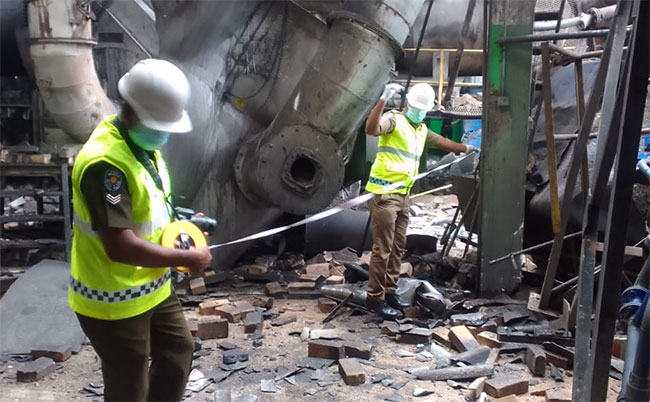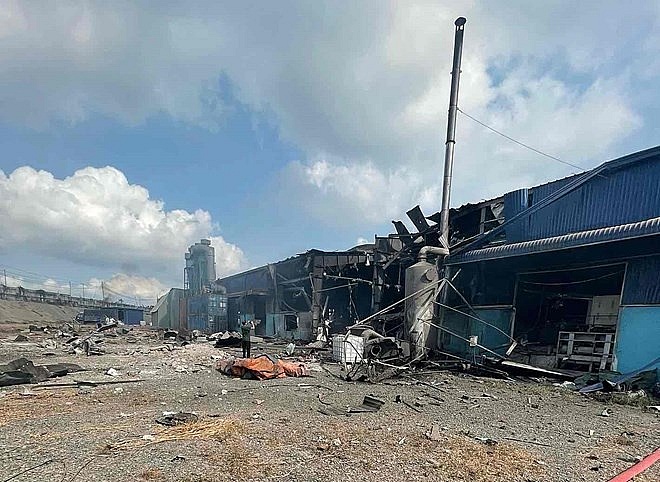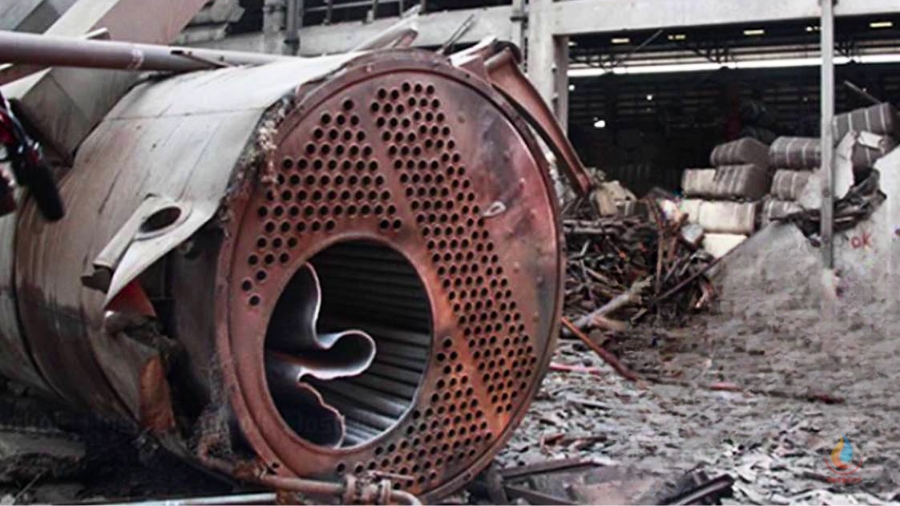Boilers are essential equipment in various industries, playing a crucial role in generating steam for production processes. However, improper operation and maintenance can lead to serious failures, particularly boiler explosions – catastrophic incidents that pose severe risks to human life and property.
This article will help you identify early warning signs of potential boiler explosions and provide effective preventive measures to ensure safe operation.
1. Warning Signs of Potential Boiler Explosions
1.1. Abnormal Pressure Fluctuations
- Sudden spikes or unexpected drops in boiler pressure
- Inaccurate or highly fluctuating pressure gauge readings.
- Safety valves continuously releasing steam or failing to activate.
- Pressure warning systems issuing frequent alerts.
1.2. Steam Leaks
- Steam escaping from joints, welds, valves, or the boiler shell.
- Persistent, small leaks that gradually worsen over time.
- Visible steam emissions or excessive moisture around the boiler.
- Unusual increases in ambient temperature near the boiler.
1.3. Unstable Water Levels
- Water level fluctuating unpredictably—either too high or too low.
- Inaccurate water level gauge readings.
- Automatic feedwater system failing to maintain a stable water level.
- Frequent alerts from the water level monitoring system.
1.4. Unusual Noises
- Loud banging sounds inside the boiler, possibly due to water hammer effects.
- Hissing, whistling, or excessive vibration noises from valves or piping.
- Strange noises coming from the feedwater pump or blower fan.
1.5. Excessive Vibration
- The boiler or steam piping experiencing abnormal shaking or movement.
- Supports and mounting brackets showing signs of displacement or cracking.
- Vibration monitoring systems detecting levels exceeding safety thresholds.
1.6. Abnormal Temperature Increases
- Boiler surface temperature significantly higher than normal.
- Large fluctuations in flue gas or feedwater temperature.
- Excessive heat detected in surrounding areas of the boiler.
1.7. Unusual Exhaust Gas Odors
- Burnt, oily, or chemical-like smells in boiler exhaust gases.
- Dark smoke, grayish emissions, or unusually dense fumes.
- Exhaust gas monitoring systems indicating toxic gas levels exceeding safety limits.
1.8. Visible Boiler Component Damage
- Cracks, deformation, or corrosion on the boiler shell, water tubes, and fire tubes.
- Valves and piping showing significant wear, pitting, or corrosion.
- Insulation layers peeling off or becoming damaged.
- Weld joints exhibiting signs of leakage or visible cracking.

By recognizing these warning signs early and implementing strict safety and maintenance protocols, businesses can prevent boiler explosions, ensuring a safer and more reliable operation.
2. Causes of Boiler Explosions
2.1. Boiler Water Shortage
Water shortage is one of the most dangerous causes that can lead to a boiler explosion. When the water level in the boiler drops too low, heat-exposed surfaces such as steam-generating tubes and the firebox plate become overheated due to the absence of a cooling water layer. If the metal temperature rises beyond its tolerance limit, the boiler structure may deform or crack. In cases of sudden pressure changes or the addition of cold water to a dry boiler, uneven thermal expansion may trigger an explosion.
Causes of boiler water shortage:
Malfunctioning feedwater system: If the feedwater pump fails, operates unstably, or if the water supply pipeline becomes clogged, water cannot be adequately replenished into the boiler.
Water leakage: Leaks in pipelines, heat exchangers, or valves may cause continuous water loss that remains undetected.
Faulty water level sensor: If the water level sensor is inaccurate or defective, the control system may fail to add water at the appropriate time.
Operator negligence: If operators do not regularly inspect or properly monitor the system, they may fail to notice when the water level reaches a critical low.
2.2. Excessive Pressure
A boiler operates on the principle of generating high-pressure steam. However, if the pressure exceeds the designed limit, the boiler’s metal structure may become overloaded and explode. When pressure rises too high, pressure-bearing surfaces may crack, leading to steam leakage and a pressure-induced explosion.
Causes of excessive pressure:
Faulty safety valve: The safety valve is responsible for releasing excess steam when pressure exceeds the permissible threshold. If the valve is stuck, improperly maintained, or miscalibrated, it may fail to open when necessary, causing pressure buildup in the boiler.
Defective pressure sensor: The pressure control system regulates fuel combustion to maintain pressure within a safe range. If the pressure sensor malfunctions or has a high margin of error, the boiler may continue heating even when pressure has exceeded safe limits.
Excessive fuel supply: If the fuel supply system malfunctions or lacks proper regulation, the boiler may generate excessive steam in a short period, leading to a sudden pressure surge.
Blocked steam outlet: If the steam pipeline becomes clogged with deposits, obstructed, or if valves are improperly closed, steam cannot escape, resulting in pressure accumulation inside the boiler.
2.3. Safety Device Failure
Boilers are equipped with multiple safety devices to ensure stable operation and prevent serious incidents. If these devices fail or do not function correctly, the risk of a boiler explosion significantly increases.
Causes of safety device failure:
Jammed or miscalibrated safety valve: The safety valve releases excess steam to maintain stable pressure. If the valve fails to open when necessary, pressure inside the boiler may exceed safe limits.
Inaccurate temperature or pressure sensors: If these sensors malfunction, the control system may fail to regulate the fuel supply correctly, leading to overheating or excessive pressure.
Faulty automatic feedwater system: If the feedwater system does not supply the required amount of water, the boiler may experience water shortage without timely warning.
Non-functional emergency shutdown system: When a boiler exhibits abnormal conditions, the emergency shutdown system should intervene immediately. If this system is faulty or lacks periodic maintenance, the risk of boiler explosion increases.

2.4. Improper Maintenance and Inspection
Maintenance and inspection play a crucial role in ensuring stable and safe boiler operation. If a boiler is not regularly inspected, cleaned, or properly maintained, key components may deteriorate or fail, leading to an increased risk of explosion.
Causes of poor maintenance:
Lack of periodic inspections and cleaning: Dirt and scale deposits in steam-generating tubes and heat exchangers can reduce heat transfer efficiency, causing excessive pressure and temperature buildup.
Failure to replace faulty components in time: If defective safety valves, pressure sensors, feedwater pumps, or other key components are not replaced promptly, serious incidents may occur.
Improper maintenance procedures: Some maintenance procedures require shutting down the boiler for thorough inspection and repairs. If maintenance is performed while the boiler is still running or if manufacturers’ guidelines are not followed, critical components may become damaged.
>>> Boiler consulting, inspection and maintenance services
2.5. Incorrect Boiler Operation
Boiler operation requires a strict procedural approach to ensure safety. When operators do not follow the correct procedures, the likelihood of incidents—including boiler explosions—significantly increases.
Causes of improper operation:
Overly rapid startup: When a boiler is heated too quickly, metal components may experience uneven expansion, creating mechanical stress and cracks.
Failure to inspect the system before operation: If operators do not check water levels, pressure, fuel supply, and safety systems before startup, they may overlook critical warning signs.
Improper shutdown procedures: Abruptly shutting down the boiler or failing to follow proper cooldown procedures may cause sudden changes in pressure and temperature, leading to structural damage.
Lack of continuous monitoring of pressure and water levels: If key operational parameters are not regularly checked during operation, operators may fail to detect anomalies early, leading to serious failures.
2.6. Boiler Corrosion
Corrosion is a common issue in boilers, weakening the metal structure and increasing the risk of leaks or explosions.
Causes of boiler corrosion:
Poor water quality: If feedwater contains excessive impurities, has an unstable pH, or contains high levels of dissolved oxygen, it can accelerate corrosion of metal surfaces inside the boiler.
Oxygen-induced corrosion: Dissolved oxygen in water can cause rusting, weakening the boiler shell and steam pipes.
Chemical corrosion: The improper use of chemical water treatments can disrupt pH balance, leading to severe corrosion.
Corrosion due to scaling deposits: Thick scale buildup can create localized acidic or alkaline environments, damaging the boiler’s metal surfaces.

3. Preventing Boiler Explosions
Boiler explosions can cause severe damage to property and human life. However, these incidents can be entirely prevented by implementing strict safety measures. Below are key solutions to minimize boiler explosion risks.
3.1. Regular Inspection and Maintenance
Regular inspection and maintenance are fundamental in preventing boiler explosions. This process helps detect early warning signs and prevent potential failures.
Key components to inspect regularly:
Pressure and water level: Frequently monitor these parameters using sensors and pressure gauges to ensure they function accurately.
Safety valves and pressure relief devices: Verify the operation of safety valves to ensure they can release excess pressure when needed. These valves must be calibrated and maintained according to the manufacturer’s schedule.
Water supply and feed pumps: Ensure the pumps operate efficiently and the water supply system is free from leaks or blockages.
Heat exchange surfaces: Regularly clean these surfaces to prevent scale buildup, which improves heat transfer efficiency and reduces overheating risks.
Piping and structural integrity: Detect early signs of corrosion, leaks, or cracks in welds and metal surfaces.
Important notes:
- Follow the manufacturer’s maintenance guidelines.
- Keep detailed records of all maintenance and calibration activities.
- Utilize professional maintenance services to ensure efficiency and safety.
3.2. Operator Training
Human factors play a crucial role in preventing boiler explosions. Proper training enables operators to master operating procedures, detect abnormalities early, and respond quickly to incidents.
Essential training topics:
Basic boiler knowledge: Understanding the operational principles, structure, and functions of key components such as the boiler drum, safety valves, and heat exchangers.
Standard operating procedures: Step-by-step guidance on startup, pressure adjustment, water replenishment, and safe shutdown.
Monitoring and troubleshooting skills: Identifying warning signs such as high pressure, excessive temperatures, or rapid water level drops.
Emergency response: Practicing response plans for incidents such as fuel supply shutdowns, emergency pressure relief, and safe evacuation.
Important notes:
- Conduct periodic training sessions and competency assessments.
- Encourage operators to report abnormalities.
- Update training content to reflect new technologies and industry advancements.
3.3. Using High-Quality Safety Equipment
Installing standard-compliant safety devices and maintaining them in good condition is essential to preventing boiler explosions.
Essential safety equipment:
Safety valves: The most critical device, designed to release pressure when it exceeds safe limits. These valves must undergo regular testing and calibration.
Pressure switches: These monitor pressure levels and automatically shut off fuel supply if the pressure exceeds safe limits.
Water level sensors: These sensors track and maintain water levels, issuing alerts for excessively low or high levels.
Emergency shut-off systems: Ensure the boiler has an effective emergency shutdown system capable of stopping all operations instantly when necessary.
Important notes:
- Use only certified equipment from reputable inspection agencies.
- Conduct regular inspections and calibrations to ensure accurate operation.
- Integrate automated monitoring systems with control centers for early fault detection.
3.4. Establishing Operating Rules and Emergency Procedures
A well-defined set of operating procedures and emergency protocols ensures consistency and minimizes errors in boiler operations.
Key components to develop:
Startup and shutdown procedures: Clear guidelines on safe operation steps, with a focus on pre-start checks and continuous monitoring.
Incident response protocols: Develop action plans for scenarios such as water depletion, overpressure, steam leaks, and fuel system failures.
Role and responsibility assignments: Clearly define the responsibilities of each personnel involved in operation and maintenance. Ensure employees are assigned tasks based on their expertise and training.
Important notes:
- Regularly conduct emergency drills to test operator readiness.
- Review and update procedures whenever equipment or technology changes.
- Install warning signs and visual guides in operation areas.
4. Handling Boiler Malfunctions and Fire Hazards
When detecting abnormal signs that indicate potential boiler malfunctions or explosions, swift and correct responses are crucial for safety. In these situations, staying calm and proactive can mitigate damage and prevent severe consequences.
4.1. Observing and Assessing the Situation
Upon noticing unusual signs such as strange noises, excessive vibrations, water or steam leaks, burning smells, or abnormal pressure and temperature readings, the operator must quickly assess the situation. Carefully check pressure gauges, temperature indicators, and control panel alerts. If visible cracks, steam leaks, or boiling water seeping from joints are observed, the boiler may be facing a critical failure.
4.2. Shutting Off Fuel Supply and Stopping Boiler Operation
The next immediate step is to halt the operation of the boiler. Cut off the fuel supply (oil, gas, or coal) and disconnect electrical power to eliminate fire hazards from heat sources or sparks. Using emergency switches or fuel shut-off valves is essential. For automated systems, ensure emergency shut-off mechanisms are functional and activate them if necessary.
4.3. Reducing System Pressure
If the boiler pressure rises abnormally, it must be relieved promptly to prevent explosion risks. Safety valves will automatically release pressure when it exceeds safe thresholds. However, if they fail, operators should manually activate pressure relief valves.
It is crucial to release pressure gradually to avoid thermal shock, which can cause cracks or structural damage. Additionally, operators must avoid direct exposure to escaping steam or boiling water.
4.4. Enhancing Ventilation and Releasing Toxic Gases
If toxic gas leaks (such as CO or flammable gases) are suspected, proper ventilation is critical. Open all windows, doors, or activate exhaust fans to expel hazardous gases. In cases of excessive gas concentrations, use protective masks and evacuate the area immediately.
4.5. Evacuation and Emergency Assistance
If the situation is uncontrollable or a significant explosion risk exists, evacuating all personnel from the hazardous area must be the top priority. Activate alarm systems and guide everyone to safe zones. Immediately contact the fire department and emergency response teams for assistance.
If individuals suffer burns or gas poisoning, administer first aid and call emergency medical services. Proper initial treatment can reduce severe injuries.
4.6. Investigating Causes and Rectifying Boiler Failures
After the incident is under control, a comprehensive inspection should be conducted to identify the root cause. This process should be carried out by skilled technical teams. Key areas to examine include:
- Water supply and drainage systems
- Safety valves and pressure control mechanisms
- Combustion and heat exchange components
- Electrical systems and emergency shutdown mechanisms
Following the inspection, corrective measures must be implemented before restarting the boiler. A detailed incident report should be compiled to improve future safety measures.
Boiler explosions are severe incidents that can cause significant damage to both lives and property. However, by conducting regular inspections and maintenance, training a professional operating team, utilizing safety-compliant equipment, and establishing clear operational procedures, the risk of boiler explosions can be effectively controlled.
Take action today to safeguard your business and employees. Inspect your equipment, implement routine maintenance, and ensure your operating team is always prepared to handle any situation. Boiler safety is not just a responsibility—it is a commitment to a safe and efficient working environment.
